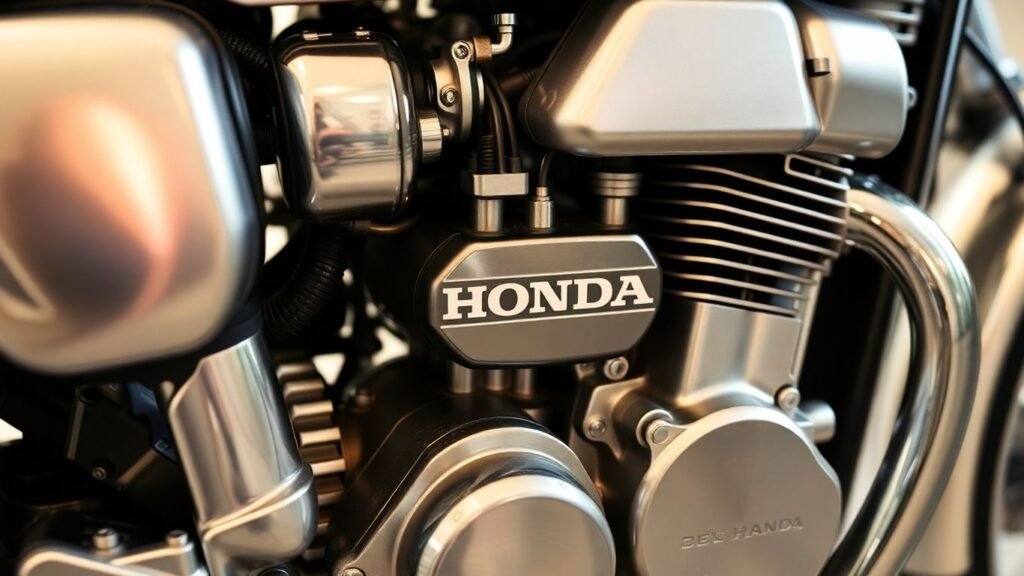Keeping your Honda running smoothly is a big deal. These cars are known for being reliable, but even the best machines need a little attention now and then. If you’re hearing strange noises, noticing a dip in performance, or just want to make sure everything is in top shape, finding the right person to look after your engine is key. That’s where a dedicated Honda Engine Specialist comes in. They know these engines inside and out, which can save you time, money, and a whole lot of headaches down the road.
Key Takeaways
- A specialized Honda Engine Specialist understands the unique engineering of Honda engines, leading to more accurate diagnostics and repairs.
- Regular, expert maintenance from a Honda Engine Specialist helps prevent common issues and extends the life of your vehicle.
- Look for certifications, specific Honda training, and positive customer feedback when choosing a Honda Engine Specialist.
- Advanced diagnostic tools and techniques are used by specialists to pinpoint even minor engine problems.
- Proactive maintenance, like fluid checks and timing belt services, performed by a Honda Engine Specialist is vital for long-term reliability.
Finding A Premier Honda Engine Specialist

Understanding The Importance Of Specialized Honda Engine Care
Your Honda engine is a complex piece of machinery, and like any finely tuned instrument, it needs care from people who really know its ins and outs. Trying to get general auto repair shops to handle specific Honda engine issues can sometimes lead to more problems than it solves. These engines have their own quirks and specific needs, and a specialist understands these nuances. Getting the right attention for your Honda engine means it’ll run smoother, last longer, and avoid costly breakdowns down the road. It’s about keeping that reliable Honda performance you count on, day in and day out.
Why Choose A Dedicated Honda Engine Specialist
When you take your Honda to a shop that focuses specifically on the brand, you’re tapping into a deeper well of knowledge. These technicians spend their days working on Hondas, so they’re familiar with common problems, unique designs, and the best ways to fix them. They’re not just mechanics; they’re Honda enthusiasts who understand the engineering. This focused experience often means quicker diagnoses and more accurate repairs. Plus, they’re more likely to have the specific tools and parts needed for your particular Honda model, which can save you time and hassle.
Signs Your Honda Engine Needs Expert Attention
Sometimes, your Honda will give you hints that something’s not quite right with the engine. You might notice unusual noises, like knocking or ticking, especially when you start it up or accelerate. A change in how the engine sounds or feels is a big clue. Is it running rough, hesitating, or just not as peppy as it used to be? You might also see warning lights on the dashboard, like the check engine light, which is never a good sign. Other indicators include a loss of power, strange smells coming from under the hood, or even visible leaks. Don’t ignore these signals; they’re your engine telling you it’s time for a professional check-up.
Paying attention to your car’s behavior is key. Little things can sometimes point to bigger issues down the line. It’s better to get it looked at early than to wait until a small problem turns into a major repair bill. Think of it like going to a doctor for a check-up – catching things early makes a big difference.
| Symptom | Potential Issue |
|---|---|
| Knocking or Ticking | Low oil, worn bearings, or ignition timing |
| Rough Idling | Spark plugs, fuel injectors, or vacuum leaks |
| Hesitation on Acceleration | Fuel delivery problems or clogged filters |
| Check Engine Light | Wide range of issues, requires diagnostic scan |
| Loss of Power | Catalytic converter, fuel pump, or engine misfire |
| Strange Smells | Leaking fluids (oil, coolant) or exhaust leaks |
Expert Honda Engine Repair Services
When your Honda’s engine starts acting up, it’s not just a minor inconvenience; it can be a sign of bigger issues brewing. Getting expert attention for your Honda engine is key to keeping it running smoothly and preventing costly problems down the road. A dedicated specialist understands the nuances of Honda engineering, from the VTEC system to the specific needs of different engine models. They can pinpoint problems that a general mechanic might miss, saving you time and money in the long run.
Comprehensive Engine Diagnostics For Honda Vehicles
Figuring out exactly what’s wrong with a modern Honda engine can be tricky. That’s where advanced diagnostic tools come into play. Technicians use specialized equipment that plugs into your car’s computer to read error codes and monitor performance data. This helps them get a clear picture of what’s happening internally. They’ll look at things like fuel injector performance, ignition timing, and exhaust gas readings. It’s like a full check-up for your engine’s vital signs.
Addressing Common Honda Engine Issues
Hondas are generally reliable, but like any car, they can develop specific problems. You might notice rough idling, a loss of power, strange noises, or even a check engine light. Common culprits can include issues with the ignition system, like worn spark plugs or faulty ignition coils. Sometimes, it’s a fuel delivery problem, or perhaps an issue with the exhaust system. A specialist will know the typical weak spots for your particular Honda model and year, making the repair process much faster.
Advanced Engine Repair Techniques
When repairs are needed, a specialist goes beyond just replacing parts. They use techniques that ensure the repair is done right the first time. This might involve using specialized tools for engine component removal and installation, or performing precise adjustments to get everything back to factory specifications. For example, if a head gasket needs replacing, they’ll ensure the engine block is perfectly clean and flat before reassembly. It’s about restoring the engine’s original performance and reliability, not just patching it up.
Sometimes, a simple fix isn’t enough. A specialist can identify if a repair requires a more involved approach, like rebuilding a specific engine component or addressing underlying issues that caused the problem in the first place. This kind of in-depth work is what separates a good repair from a great one.
| Common Issue | Potential Cause |
|---|---|
| Rough Idle | Spark plugs, ignition coils, vacuum leak |
| Loss of Power | Fuel filter, catalytic converter, MAF sensor |
| Engine Knocking | Incorrect fuel octane, carbon buildup |
| Overheating | Thermostat, radiator, water pump |
Proactive Honda Engine Maintenance

Keeping your Honda engine in good shape isn’t just about fixing things when they break. It’s about staying ahead of the game. Regular check-ups and a few key services can make a big difference in how long your engine lasts and how well it runs. Think of it like going to the doctor for a check-up instead of waiting until you’re really sick. It’s just smarter.
Routine Maintenance For Optimal Engine Performance
Your Honda engine is a complex piece of machinery, and like any machine, it needs regular attention to keep running smoothly. This isn’t just about oil changes, though those are super important. It involves a whole system of checks and services that a specialist can handle. They know what to look for, what sounds are normal, and what might be an early warning sign. Getting these routine services done by someone who really knows Hondas means your engine will perform better and last longer. It’s about preventing small issues from turning into big, expensive problems down the road. A good specialist will have a checklist of things to inspect, from the belts and hoses to the exhaust system and engine mounts. They can spot leaks, wear and tear, or anything that just doesn’t seem right before it causes a breakdown.
Essential Fluid Checks And Replacements
Fluids are the lifeblood of your engine. You’ve got engine oil, coolant, brake fluid, power steering fluid, and transmission fluid, just to name a few. Each one has a specific job, and when they get old or dirty, they can’t do their job effectively. For example, old engine oil loses its ability to lubricate, leading to increased friction and wear. Coolant that’s past its prime won’t protect your engine from overheating or freezing. A Honda specialist knows the correct type and amount of each fluid your specific model needs, and they know when it’s time to change them. They can also check for leaks or contamination, which can be signs of bigger issues.
Here’s a quick look at some common fluid service intervals:
| Fluid Type | Typical Replacement Interval (Miles) | Notes |
|---|---|---|
| Engine Oil | 5,000 – 10,000 | Varies by oil type and driving conditions |
| Coolant | 30,000 – 60,000 | Check owner’s manual for specific type |
| Brake Fluid | 24,000 – 36,000 | Absorbs moisture over time |
| Transmission Fluid | 30,000 – 100,000 | Varies greatly by transmission type |
Timing Belt And Spark Plug Service
These two items are often overlooked until they cause a problem, but they are really important for your engine’s health. The timing belt, for instance, keeps the engine’s valves and pistons working in sync. If it breaks, it can cause catastrophic engine damage, often meaning a complete engine rebuild or replacement. Honda recommends specific mileage intervals for timing belt replacement, and it’s not something you want to skip. Spark plugs, on the other hand, ignite the fuel-air mixture in your engine’s cylinders. Worn-out spark plugs can lead to misfires, poor fuel economy, and a rough-running engine. A specialist will know the correct type of spark plugs for your Honda and can replace them efficiently, making sure your engine fires up cleanly every time.
Skipping these services is like playing Russian roulette with your engine. The cost of replacing a timing belt is a fraction of the cost of repairing the damage caused by a broken one. Similarly, fresh spark plugs contribute to better fuel efficiency and a smoother ride.
Specialized Honda Engine Diagnostics
When your Honda starts acting up, it’s not always obvious what’s going on. That’s where specialized diagnostics come in. Think of it like a doctor running tests to figure out what’s wrong with you. A good Honda specialist has the right tools and know-how to pinpoint engine problems accurately. They can tell you more than just ‘something’s wrong’; they can tell you exactly what’s wrong and how to fix it.
Utilizing Advanced Diagnostic Tools
Modern cars, especially Hondas, are packed with computers and sensors. To figure out what’s happening under the hood, technicians use special equipment. These aren’t your average wrenches and screwdrivers. They use scanners that plug into your car’s computer system. These scanners can read error codes that the car’s computer throws out when it detects a problem. They also let the technician see live data from various sensors – like how the engine is breathing or how the fuel is being injected. This information is super important for figuring out the root cause of an issue, not just the symptom.
Interpreting Engine Codes and Performance Data
Getting a bunch of codes from a scanner is one thing, but knowing what they mean is another. That’s the skill of a specialist. They understand that a code might point to a faulty sensor, but the real problem could be something else that’s causing that sensor to read incorrectly. They look at the patterns in the data. For example, if the engine is misfiring, they can see which cylinder is having trouble and check things like spark plugs, fuel injectors, or even compression in that specific cylinder. It’s like putting together puzzle pieces to get the full picture.
Identifying Subtle Engine Problems
Sometimes, an engine problem isn’t a big, obvious breakdown. It might be a slight loss of power, a little rough idle, or a small drop in fuel economy. These can be hard to spot without the right diagnostic approach. Specialists can detect these subtle issues by looking at performance data over time or by using specialized tests that measure things like exhaust gas composition or engine vacuum. They know what normal performance looks like for your specific Honda model and can spot when things are just a little bit off, preventing bigger problems down the road.
A good diagnostic process isn’t just about fixing what’s broken right now. It’s about understanding the whole system and how all the parts work together. This helps prevent future issues and keeps your Honda running smoothly for longer.
Choosing The Right Honda Engine Specialist
Finding someone who really knows Honda engines can make a big difference. It’s not just about fixing a problem; it’s about keeping your car running right for a long time. You want a place that’s focused on Hondas, not just a general repair shop that sees them now and then. Look for technicians who have specific training and certifications for Honda vehicles. This shows they’ve put in the work to understand the ins and outs of your specific make and model.
Certifications and Training for Honda Technicians
When you’re looking for a specialist, check if their technicians have official Honda certifications. These aren’t just handed out; they mean the mechanics have passed tests and shown they know how to work on Hondas. It’s like a doctor specializing in a certain area of medicine. A certified Honda technician has proven they understand the unique systems and engineering that go into your car. This training covers everything from the engine’s complex electronics to its specific performance needs.
Experience with Various Honda Engine Types
Honda has made a lot of different engines over the years, from the small, fuel-efficient ones in the Civic to the more powerful V6s in some of their SUVs. A good specialist will have experience with all of them. They’ll know the common issues that pop up with older models and the newer technologies in the latest cars. It’s helpful if they can tell you about their experience with your particular engine type. For example, have they worked on many of the VTEC engines, or perhaps the hybrid powertrains? Knowing this can give you peace of mind.
Customer Reviews and Reputation
What other people say about a repair shop is pretty important. Online reviews can give you a good idea of what to expect. Look for comments about honesty, fair pricing, and how well the work was done. Did the shop fix the problem the first time? Were customers treated well? A shop with a lot of positive feedback and a good reputation is usually a safe bet. It shows they’ve been consistently doing good work for other Honda owners.
A shop that specializes in Honda engines often has access to specific tools and diagnostic equipment designed just for your car. This means they can find problems faster and fix them more accurately than a place that uses generic equipment.
| Service Type | Common Issues Addressed |
|---|---|
| Engine Diagnostics | Check Engine Light, Misfires, Rough Idling |
| Routine Maintenance | Oil Changes, Filter Replacements, Fluid Checks |
| Major Repairs | Timing Belt Replacement, Head Gasket Repair, Transmission Service |
Maintaining Your Honda’s Longevity
Keeping your Honda running smoothly for years to come is a big deal, and it’s not just about fixing things when they break. It’s about being smart with how you take care of it day in and day out. Think of it like this: you wouldn’t expect your body to feel great if you never ate well or got enough sleep, right? Your car is kind of the same way. Regular check-ups and a little attention can make a huge difference in how long your Honda lasts and how well it performs.
The Role of a Honda Engine Specialist in Vehicle Lifespan
When you have a specialist who really knows Honda engines, they can spot little things that might become big problems later. They’re not just looking at the engine; they’re looking at how everything works together. This means they can catch issues early, like a slight oil leak that could lead to bigger damage if ignored, or a belt that’s starting to fray. A good specialist helps prevent costly repairs down the road by being proactive. They have the right tools and the know-how to work on your specific Honda model, making sure any work done is top-notch.
Taking your Honda to someone who specializes in them means they understand the nuances of the engine. They know what sounds are normal and what aren’t, and they’re familiar with common wear patterns for different Honda models. This focused knowledge is what helps extend the life of your vehicle beyond what you might expect.
Preventative Measures for Engine Health
Preventing problems is way better than fixing them. For your Honda’s engine, this means sticking to a maintenance schedule. Things like regular oil changes are super important, but so are other checks. A specialist will look at things like your coolant levels, the condition of your hoses, and the drive belts. They might also recommend checking your transmission fluid and brake fluid. It’s all about keeping the engine and its supporting systems in good shape.
Here’s a quick look at some common preventative services:
| Service Item | Recommended Interval (Typical) | Notes |
|---|---|---|
| Oil and Filter Change | Every 5,000-7,500 miles | Varies by oil type and driving conditions |
| Coolant Flush | Every 30,000-60,000 miles | Check owner’s manual for specifics |
| Transmission Fluid | Every 30,000-60,000 miles | Crucial for smooth gear changes |
| Spark Plugs | Every 60,000-100,000 miles | Depends on plug type |
Ensuring Peak Performance and Reliability
When your Honda’s engine is well-maintained, it just runs better. You’ll notice it in the way it accelerates, how smoothly it idles, and even how good your gas mileage is. A specialist can fine-tune things to make sure everything is working as it should. This means your car is not only more enjoyable to drive but also more dependable. You won’t have to worry as much about unexpected breakdowns, and you can trust your Honda to get you where you need to go, reliably, every time.
Keep Your Honda Running Smoothly
So, you’ve learned a bit about why finding the right place to fix your Honda is a good idea. It’s not just about getting the job done; it’s about making sure your car stays reliable and safe for the long haul. Whether it’s a simple oil change or something more complicated under the hood, a good specialist knows their stuff. They’ve got the right tools and the know-how to get it right the first time. Don’t just take your car anywhere; find a place that really understands Hondas. It’ll save you headaches and keep you rolling down the road with confidence.








